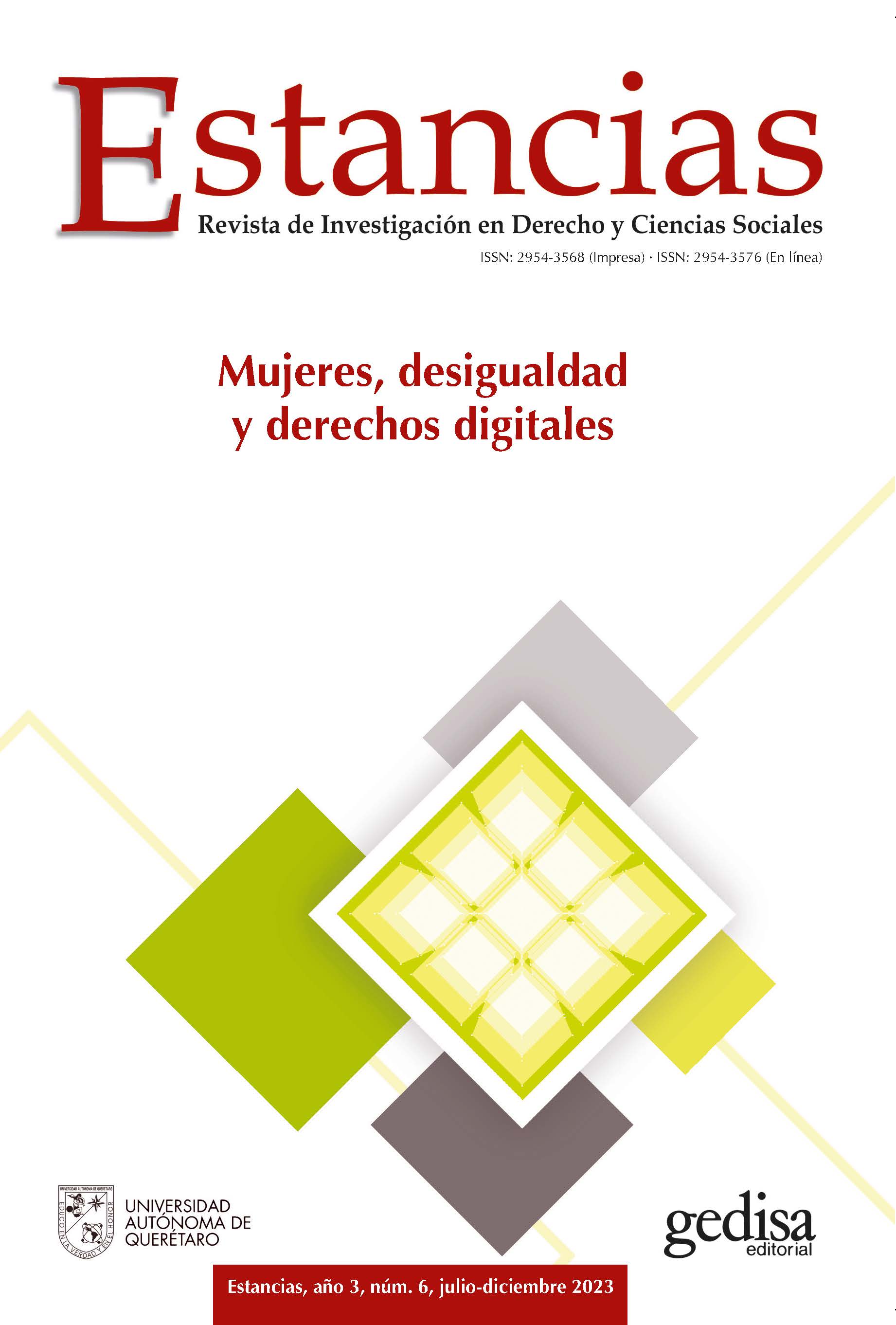Use and Appropriation of Digital Technologies in Three Activist Groups of Sexually Diverse Women: Musas de Metal, Bisexualas México and BiTriadas
Main Article Content
Abstract
The objective of this article is to analyze how three groups of sexually diverse activist women appropriate digital media in their fight against discrimination. The authors focus on the way in which these women use digital networks and design strategies to take their demands online. In order to carry out the study, we review the relationship between social movements and new media and the categories of use, appropriation, and digital strategies are discussed and utilized to analyze activists’ practices in digital scenarios. We have used a qualitative method, whereby in-depth interviews were conducted with the activists and their testimonies about their fight against discrimination and stereotyping in digital settings were recovered.
Article Details

This work is licensed under a Creative Commons Attribution-NonCommercial-ShareAlike 4.0 International License.
How to Cite
References
Acosta, M. (2020). Diversidad sexual y espacio público digital. La dinámica comunicacional de los/las usuarios/as del hashtag #LoveIsLove en Twitter. Hologramática, 33 (2), 23-50.
Bennett, W., y A. Segerberg (2013). The Logic of Connective Action: Digital Media and the Personalization of Contentious Politics. Cambridge University Press.
Cáceres, J. G., y J. I. González-Acosta (2013). # YoSoy132: La primera erupción visible. Global Talent University Press.
Cammaerts, B. (2018). The Circulation of Anti-Austerity Protest. Palgrave Macmillan.
Casero-Ripollés, A. (2015). Estrategias y prácticas comunicativas del activismo político en las redes sociales en España. Historia y Comunicación Social, 20 (2). Disponible en: http://repositori.uji.es/xmlui/bitstream/handle/10234/149107/70872.pdf?sequenc
Ciszek, E. L. (2017). Todo mejor en el ambiente: An Analysis of Digital LGBT Activism in Mexico. Journal of Communication Inquiry, 41 (4), 313-330.
Crovi, D. (2020). Para leer la apropiación digital Una transformación de las prácticas culturales. Tintable.
Della Porta, D., y E. Pavan (2017). Repertoires of Knowledge Practices: Social Movements in Times of Crisis. Qualitative Research in Organizations and Management. 12 (4), 297-314.
Fernández-Prados, J. S. (2012). Ciberactivismo: Conceptualización, hipótesis y medida. ARBOR Ciencia, Pensamiento y Cultura, 188, 631-639.
Garay Cruz, L. M. (2017). Aires de esperanza. Activistas universitarios y gestión comunicativa de redes sociales digitales: Más allá de los mitos. En R. González Villareal y G. Oliver. Resistencias y Alternativas. Relación histórico-política de movimientos sociales en educación. UAM y RED de Movimientos Sociales.
Gendler, M., A. Méndez, F. Samaniego y S. Amado (2018). Uso, apropiación, cooptación y creación: Pensando nuevas herramientas para el abordaje de la Apropiación Social de Tecnologías. Acerca de la apropiación de tecnologías: teoría, estudios y debates.
González-Lizárraga, M., M. Becerra-Traver y M. Yanez-Díaz (2016). Ciberactivismo: Una nueva forma de participación para estudiantes universitarios. Revista Comunicar, XXIV, 47-54.
Gorkemli, S. (2012). “Coming Out of the internet” Lesbian and Gay Activism and the Internet as a “Digital Closet” in Turkey. Journal of Middle East Women’s Studies, 8(3), 63-88.
Lagarde y de los Ríos, M. (1990). Los cautiverios de las mujeres. Madresposas, monjas, putas (5a edición). Siglo XXI.
Leung, R., & Williams, R. (2019). # MeToo and intersectionality: An examination of the# MeToo movement through the R. Kelly scandal. Journal of Communication Inquiry, 43 (4), 349-371.
Neuman, M. (2008). La apropiación tecnológica como práctica de resistencia y negociación en la globalización. Paper presentado en el IXo Congreso Latinoamericano de Investigadores de la Comunicación. México.
Pavan, E., y A. Felicetti (2019). Digital Media and Knowledge Production within Social Movements: Insights from the Transition Movement in Italy. Social Media + Society, 5 (4).
Lemus, M. C. P. (2018). Procesos, prácticas y actores de comunicación alternativa digital en el contexto mexicano. Global Media Journal, 15 (29), 240-271.
Postmes, T., y S. Brunsting (2002). Collective Action in the Age of the Internet: Mass Communication and Online Mobilization. Social Science Computer Review, 20 (3), 290-301.
Rodríguez Zepeda, J. (2006). Un marco teórico para la discriminación. CONAPRED
Rohm, R. H. D., G. Valuano y S. F. Xavier (2023). The Role of Digital Activism within Social Movements to Foster Democratization in the Global South: The Case of Ni una menos. Espacio abierto, 32 (1), 29-50.
Rovira, G. (2013). Activismo mediático y criminalización de la protesta: Medios y movimientos sociales en México. Convergencia, 20, 35-60.
Rovira, G. (2016). Activismo en red y multitudes conectadas. Icaria-UAM.
Tilly, C., L. J. Wood y E. Castañeda (2018). Social Movements, 1768-2018. Routledge.
Van Laer, J., y P. Van Aelst (2010). Internet and Social Movement Action Repertoires. Information, Communication and Society, 13 (8), 1146-1171.
Ventura, R. (2019). LGBT/Queer media studies: Aportaciones para su consolidación como campo de estudio [Doctoral, Universidad Pompeu Fabra. Departamento de Comunicación]. https://www.tesisenred.net/handle/10803/666646#page=1
Winocur, R., y R. S. Vilela (2016). Familias pobres y computadoras: Claroscuros de la apropiación digital. Planeta.
Zeifer, B. (2020). El hashtag contestatario: Cuando los hashtags tienen efectos políticos. Dígitos. Revista de Comunicación Digital, 6, 101-118.
